|
|
|
Sort Order |
|
|
|
Items / Page
|
|
|
|
|
|
|
| Srl | Item |
| 1 |
ID:
179552
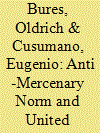

|
|
|
|
|
| Summary/Abstract |
A prominent anti-mercenary norm entrepreneur in the second half of the twentieth century, the United Nations (UN) has become an equally prominent user of Private Military and Security Companies (PMSCs) services in the twenty-first century. In this article, we explain the gap between UN talk and action on private providers of security as a form of organized hypocrisy. To map the mismatch between UN rhetoric and behaviour in a measurable fashion, we combined official data on the use of PMSCs with an in-depth content analysis of the reports written by the UN Working Group on Mercenaries and an examination of the UN Department of Safety and Security (UNDSS) contracting policy. The Working Group’s very negative portrayal of PMSCs and the UNDSS caveat that armed contractors should only be used as a last resort and stands in stark contrast with UN agencies’ widespread use of private security providers. Although a decoupling between talk and action is often inevitable for complex organizations simultaneously pursuing contradictory objectives like the UN, our findings have important implications for peacekeeping. Most notably, organized hypocrisy is in danger of challenging the UN’s credibility as a norm entrepreneur, hindering the effectiveness of its agencies’ outsourcing practices and delaying the reform of UN peacekeeping and crisis management at large.
|
|
|
|
|
|
|
|
|
|
|
|
|
|
|
|
| 2 |
ID:
179554
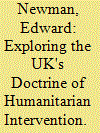

|
|
|
|
|
| Summary/Abstract |
UK governments have often claimed that humanitarian intervention – without the consent of the target state and if necessary without express UN Security Council authorization – is legally permissible in exceptional circumstances, a stance that is highly controversial. The UK’s position is at odds with prevailing international legal doctrine, which is counterintuitive for a country that is generally committed to international law, the UN framework, and multilateralism. It is also in tension with normative developments related to human protection, such as the international ‘Responsibility to Protect’ principle, which established that coercive responses to human suffering must be authorized by the UN Security Council. This article explores the background to the UK’s position on humanitarian intervention, and it argues that this reflects an element of continuity in the UK’s foreign policy in historical perspective, as a legacy of global engagement and a sense of moral righteousness and duty. The article also considers whether the UK’s position may be contributing to an evolution of the norms governing the use of force for human protection.
|
|
|
|
|
|
|
|
|
|
|
|
|
|
|
|
| 3 |
ID:
179550
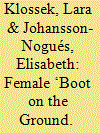

|
|
|
|
|
| Summary/Abstract |
The Indian government has presented itself as a champion of gender mainstreaming in UN peacekeeping. At the same time, the domestic security sector in India continues to create a gender-segregated environment and experiences of uniformed women in the field show remaining barriers for gender equity. Given this contradiction, the article examines the ambivalence inherent to Indian gender mainstreaming of peacekeeping units. We argue that transnational norms, such as gender mainstreaming, are embedded in larger norm bundles, and we combine the literature of norm localization and norm contestation in our conceptual framework to illustrate how India localizes parts of the gender mainstreaming norm bundle whilst contesting others. We find that India’s localization of the gender mainstreaming norm has meant to pursue an asymmetric gender-parity approach between different branches of the Indian security forces and that it has fomented a division of labour within the police corps. Moreover, we illustrate how India contests the idea of placing women in security-sensitive areas, in combat roles, and gender-integrated police units.
|
|
|
|
|
|
|
|
|
|
|
|
|
|
|
|
| 4 |
ID:
179555
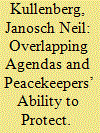

|
|
|
|
|
| Summary/Abstract |
This article scrutinizes the overlaps between three major UN policy agendas to explain how their interaction impacts the delivery of protection, particularly against conflict-related sexual violence (CRSV). Building on Pierre Bourdieu, it reconstructs the ‘field of international interventions’ and subsequently analyses the evolution of the protection mandate, highlighting the complementarities and contradictions between Children and Armed Conflict, Protection of Civilians and Women, Peace and Security. My findings suggest that while these agendas have reinforced each other during their establishment and institutionalization, the multiplication of administrative structures has also led to the compartmentalization of protection. The field’s competitive pressures, furthermore, push organizations to focus on their own mandates and subsume aspects of other agendas under them. Data from the Democratic Republic of Congo indicate that despite recognizing the need for gender-sensitive approaches, UN peacekeeping largely continues to understand protection against CRSV as part of its general protection efforts. Therefore, the militarized and gender-ignorant approach to protection prevails and specific measures to address sexual violence remain too headquarters-driven.
|
|
|
|
|
|
|
|
|
|
|
|
|
|
|
|
| 5 |
ID:
179553
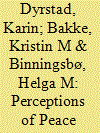

|
|
|
|
|
| Summary/Abstract |
(Re)gaining citizens’ trust is a challenge for post-war governments. Political trust is crucial for understanding both the risk of civil war in the first place and the state-society relationships that emerge afterwards. Peace agreements are tools to stop the fighting, address war’s injustices, and provide a blueprint for the state’s future – and they do so to varying degrees. Yet we have little systematic knowledge of how people react to such agreements and with what consequences. We argue that in post-war societies, people’s perceptions of the strategies aimed at ending the violence and (re)building the state have an enduring impact on people’s view of the state. In this study, we examine the association between post-conflict political trust and people’s approval of peace agreements analyzing a set of nationally representative, comparative surveys from Guatemala, Nepal, and Northern Ireland, three cases where long civil wars were ended by peace agreements. We find that individuals’ approval of the agreement and the perception that it has been implemented are positively associated with political trust, and that accounting for views of the peace agreement substantially improve on conventional explanations for political trust.
|
|
|
|
|
|
|
|
|
|
|
|
|
|
|
|
| 6 |
ID:
179551
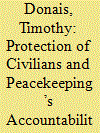

|
|
|
|
|
| Summary/Abstract |
Debates around performance and accountability are now front and centre in discussions around peacekeeping reform. Both concepts are prominent in the UN Secretary-General’s Action for Peacekeeping Initiative, while the Security Council recently stressed the need to improve ‘posture, behaviour, leadership, initiative and accountability’ within peace operations. This paper explores the politics of the accountability debate and the prospects for improved peacekeeper accountability in the context of protection of civilians (PoC) mandates, with an understanding that civilians in conflict often need protection not only from conflict parties but also – as the struggles with sexual exploitation and abuse (SEA) demonstrate – from peacekeepers themselves. While strengthened accountability mechanisms can help bridge the gap between the promise and the practice of protection, declining peacekeeping budgets and the amorphous and all-encompassing nature of PoC mandates complicate developing specific performance metrics and accountability mechanisms. Thus, while the UN has struggled to ensure misconduct accountability with regard to SEA, performance accountability represents a challenge of considerably greater magnitude. Absent serious consideration of the structural impediments involved, and the imperative of managing ambiguity, the accountability/performance debate may do little more than exacerbate tensions between those countries who staff peacekeeping missions and those who pay for them.
|
|
|
|
|
|
|
|
|
|
|
|
|
|
|
|
|
|
|
|
|